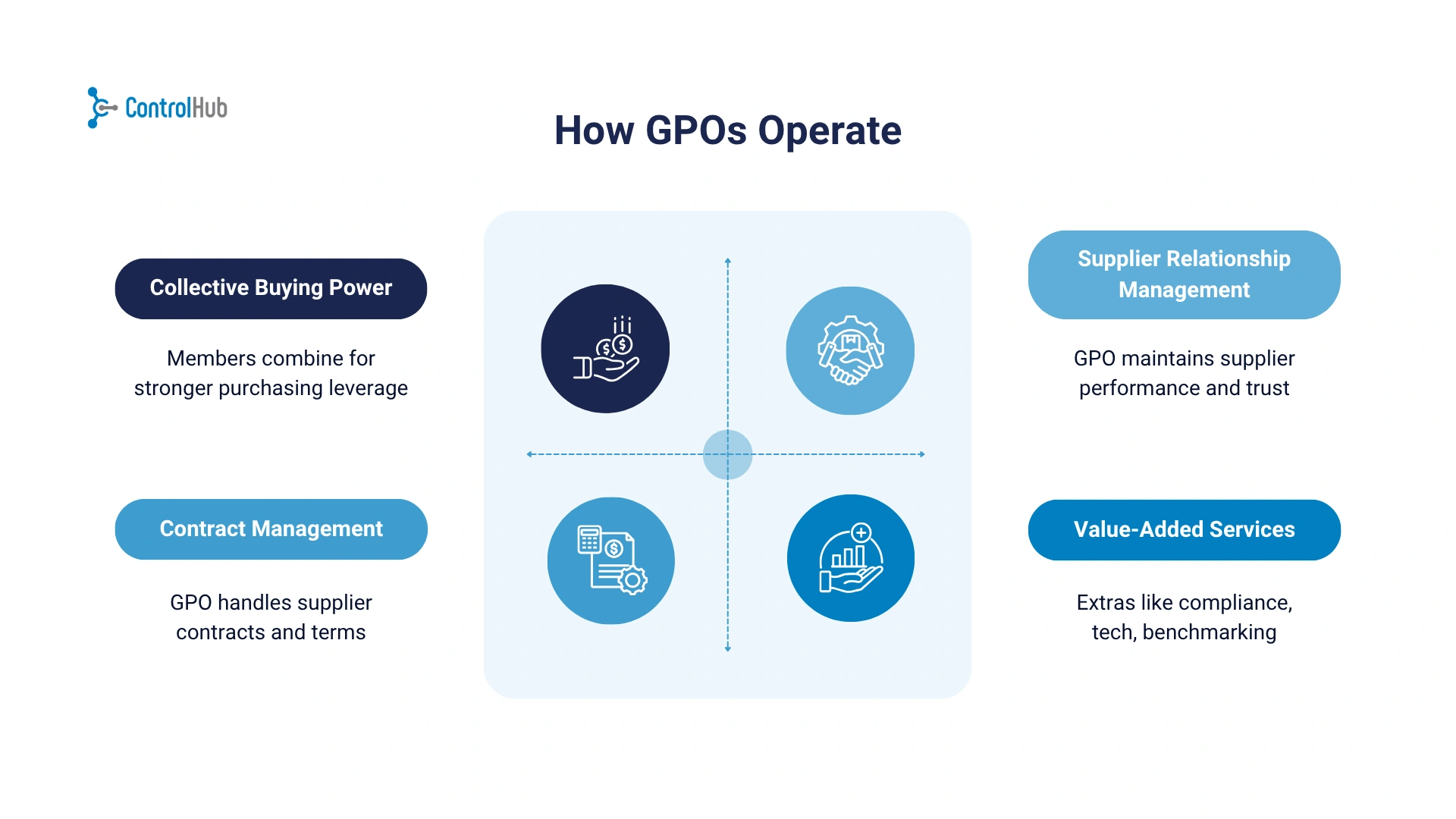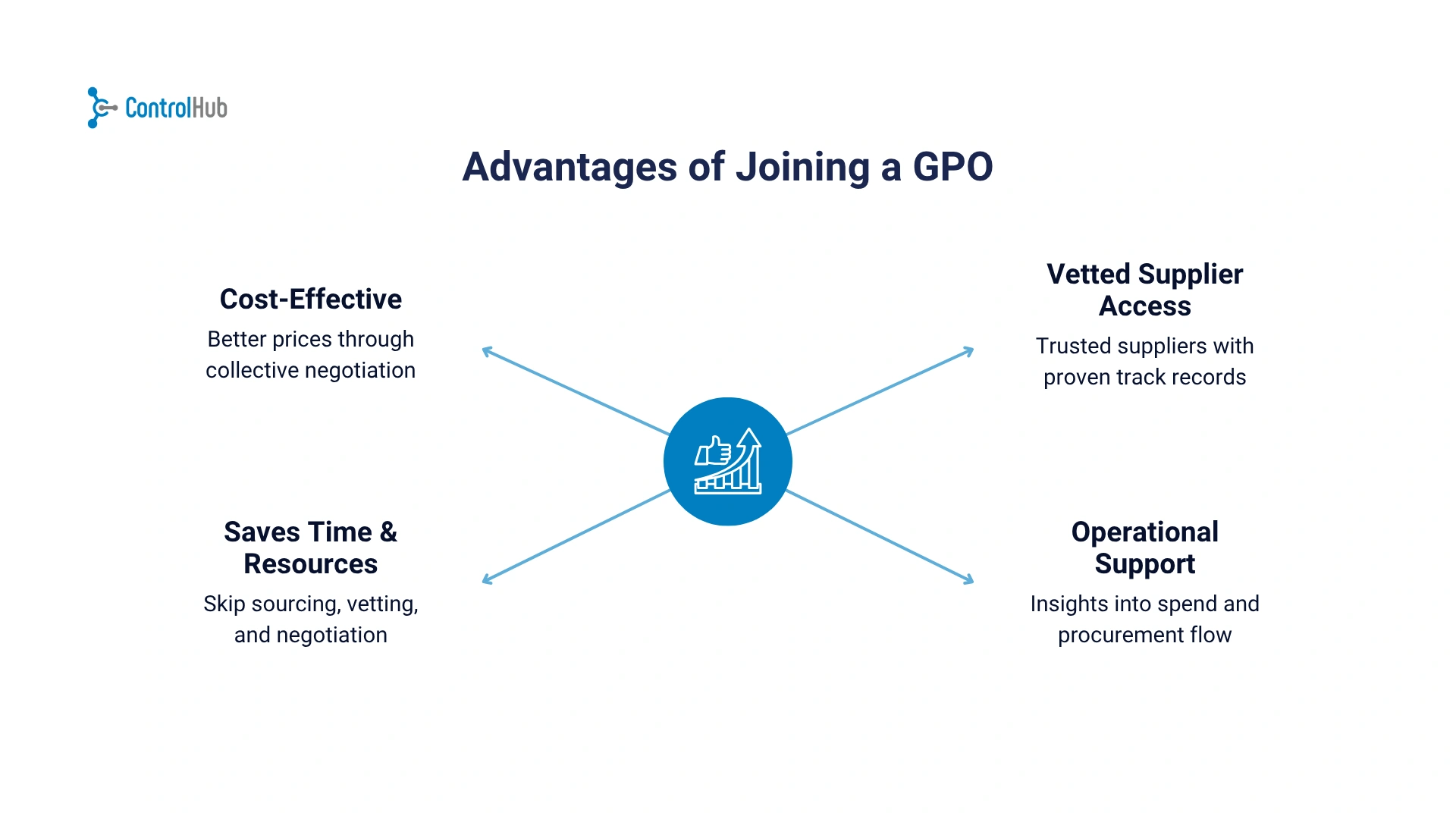Free Supplier Risk Scorecard Download
Download our free supplier risk scorecard here!
Download the free tool!AI Summarize:
Some things are better done in partnerships.
Small and medium-sized businesses or companies that are only starting in the market sometimes face a common problem when it comes to procurement.
They just don't have sufficient bargaining power to strike a positive deal with important suppliers. Or maybe that's not even the main issue, but rather a lack of high-order volumes.
Maybe your company is still too young to have its own procurement department, and you are the only one trying to figure out what to purchase and when.
Well, you are certainly not alone.
That's what drives some business leaders to enter into a group purchasing organization.
A…what?
Let's discover it
What's a Group Purchasing Organization?
A group purchasing organization, or GPO, is a system many businesses rely on to combine their purchasing power and be attractive to potential key suppliers.
But that's not all
Joining a GPO isn't limited to only benefiting from a nice price deal, you'll also have access to their purchasing expertise, standardized processes, and contract management knowledge.
In some scenarios, you can also support each other with additional activities like spend analysis or market research.
Types of GPOs
As with any other association, you'll find that not all group purchasing organizations are the same. Yes, they all want to work together around a common objective: purchasing.
But there are some differences between, for example, a GPO created around a specific industry and one that's more generally oriented.
Vertical GPOs
So your company operates in a very specialized industry?
Then, this kind of group purchasing organization makes sense to you.
A vertical GPO focuses on working with one particular sector, offering you that precious inside knowledge your business might be lacking.
Horizontal GPOs
This category is ideal if you only need assistance purchasing general products. Horizontal GPOs commonly work across different industries, so you can expect to find a broader approach to procurement.
Free Supplier Risk Scorecard Download
Download our free supplier risk scorecard here!
Download the free tool!How GPOs Operate
As with any other system, there's a certain structure that makes GPOs work.
These are the most common group purchasing organizations:
Collective buying power
This is probably the most standout feature of any GPO.
When you're part of a group that's precisely designed to make purchasing more accessible, you have unique leverage on the market. Suddenly, you are not alone; you belong to a consortium of businesses seeking to purchase, and that makes a strong statement to suppliers.
Instead of struggling with small individual orders nobody seems interested in covering, you are enjoying the buying power of the whole group. The more members a GPO has, the more powerful it becomes.
Contract management
It's important to note that group purchasing organizations aren't only a bunch of random companies that get together just for the sake of it.
It's a formal association that comes with its own level of procurement expertise, so members like you don't have to spend time reviewing contracts and seeking the best way to negotiate terms. GPOs establish and maintain supplier contracts on your behalf.
You still have the flexibility to choose from available suppliers, but you don’t have to do everything on your own.
Supplier relationship management
This is another advantage.
We all know how critical it is to maintain positive relationships with suppliers.
We also know that it isn't meant to be a simple task.
Especially if you're already handling multiple projects, working under a GPO system takes that responsibility off your plate. They're the ones in charge of maintaining supplier relationships on the good side, making sure performance is as great as expected.
Value-added services
Remember how we said that group purchasing organizations aren't just about purchasing?
Many GPOs offer additional services, including:
- Spend analysis and benchmarking
- Regulatory compliance support, especially important in the healthcare and food industries.
- Technology platforms for procurement automation
Free Supplier Risk Scorecard Download
Download our free supplier risk scorecard here!
Download the free tool!Advantages of Joining a GPO
It's cost-effective
Pretty obvious but absolutely important nonetheless.
Since GPOs negotiate deals representing their members, they're able to secure fairer deals with suppliers.
This means you can pay less for the products and services your company needs.
Saves time and resources
Time is one of the most precious commodities out there.
Without the right support network, procurement can become a nightmare.
From searching for the best suppliers, gaining their attention, going over quotations, making sure they're the right fit…
It's honestly a lot.
A GPO does all of that for you. You get pre-negotiated contracts and the peace of mind knowing you're working with pre-approved suppliers.
Access to a network of vetted suppliers
And speaking of reliable suppliers…
This is a common pain many new leaders face when it's time to search for potential suppliers, you just don't know who to trust.
Well, that's less of a problem to worry about when you're part of a GPO, you know you are working with professional people who more often than not, already have deep experience in your industry.
Support in operations
Procurement doesn't end when the purchase is officially completed. Group purchasing organizations are aware of this and offer you the opportunity to improve the flow of your operations, providing businesses with direct visibility into their spending habits and procurement processes that actually work.
Limitations of GPOs
Not everything that shines is gold, and while it's true that working as part of a group purchasing organization has a long list of benefits, it also comes with a set of downsides or risks.
For example:
No flexibility to choose suppliers
Deciding to go with a supplier or another usually involves a lot of thought.
You're literally choosing a partner to whom you're going to entrust the security of your supply chain. But what happens when you work as part of a GPO?
The final decision isn't up to your criteria.
Sure, you'll be presented with alternatives, from a pre-selected list, though.
If you want, and in some cases that's the best route to follow, the freedom to search and vet your own suppliers, a GPO might not work for you.
Membership fees
Group purchasing organizations are like a club at the end of the day, and just like with any other club, there's a price to pay if you want to be part of it.
Some GPOs charge membership fees or require a minimum level of participation to stay in the group. Others might expect you to commit a certain percentage of your spend to their contracts.
Be sure to read the fine print so you know what you're signing up for.
Over-reliance
GPOs are great, that we know.
But if you start seeing the group as your one solution for everything, then your business could be at risk of developing an extreme dependency on the GPO. This can be especially problematic in changing times, where you need to make decisions fast and adapt to what's happening.
How to Know If a GPO is Right for You?
Go over the following questions as you decide whether joining a group purchasing organization is the right call or not.
- Do you have limited purchasing power? Group purchasing organizations work best for small businesses or start-ups new in the industry. If your company's name doesn't ring a bell for the suppliers you want to work with, then yes, you could do well joining a GPO.
- Would you like to work with pre-negotiated contracts? And not only contracts, as we've seen, GPOs tend to work with their private supplier network, something that might seem like a fantastic solution for those businesses that don't feel ready to choose their own suppliers.
- Do you feel comfortable working with a limited choice of suppliers? Resilience in the supply chain comes from diversity; it's okay to work with a few suppliers when you are starting, but it could be a problem once the company expands and operations become more complex.
Free Supplier Risk Scorecard Download
Download our free supplier risk scorecard here!
Download the free tool!Free Supplier Risk Scorecard Download
Download our free supplier risk scorecard here!
Download the free tool!Key Takeaways
GPOs help businesses save money by combining purchasing power and negotiating better deals with suppliers.
You gain access to pre-negotiated contracts and a trusted network of vendors without doing the heavy lifting yourself.
There are two main types of GPOs:
Vertical GPOs focus on specific industries (like healthcare or manufacturing).
Horizontal GPOs serve a variety of industries with general procurement needs.
Joining a GPO can offer big advantages, including:
Lower costs
Time savings
Supplier reliability
Spend analysis tools
Extra support services
Limitations to consider include:
Less flexibility in supplier choice
Potential membership fees or spending commitments
Contracts may not fully match your specific needs.
A GPO might be right for you if:
You want better pricing without scaling up purchasing volume alone.e
You’re spending too much time on sourcing and contract management.
You’re okay using preferred suppliers chosen by the GPO.
%20(1).avif)



.webp)













.png)


